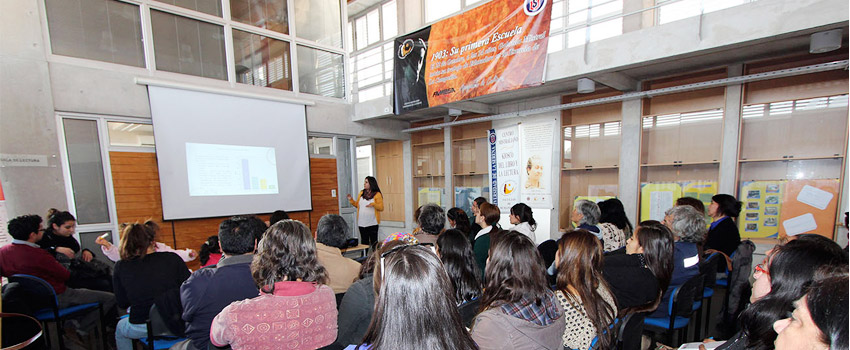
The initiative brings together cultural actors from society and all the municipal schools in the sector, who participate through the students' own families.
Cultural, educational and social actors from the community participate in the ''Mesa de Cultura y Educación de Las Compañías'', which had its second meeting at the Mistraliano Center of the University of La Serena and is organized by the Regional Center for Studies and Development of Education of the house of higher studies, CREDEULS.
The activity is part of the project ''Educational climate of the home and family expectations: articulation in a network for the expansion of the cultural and educational interests of students from the sector of Las Compañías, La Serena'' executed by CREDEULS and financed by the Carmen Goudie Foundation .
As the director of the Center and academic from the University of La Serena, Dr. María Teresa Juliá, explains, this project ''is aimed at diversifying and enriching the family educational climate, from two fronts: within the school, through the associations of representatives, and from outside, by strengthening the cultural networks that exist in Las Compañías. This activity, which we call 'Education and Culture Table', has the purpose of precisely positioning education as a central topic in social discussions in Las Compañías and enhancing all cultural resources.''
This is how the project will be able to support and even finance some initiatives that arise from the table and, likewise, act as a bridge between other ideas generated at the instance and different sources of financing.
Dr. Juliá details that, for the development of the activities of the table, CREDEULS has summoned the different social organizations of the sector (the House of Culture of Las Compañías, the Mistraliano Center, etc.) and representatives of the Centers of Parents, so that schools participate through their families, seeking "the meeting between these two worlds: the school world and that of the local culture."
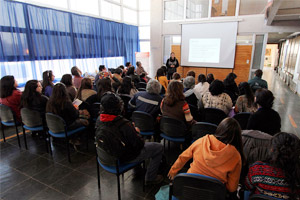 It is important to mention that the work in this area has already spanned three years, working jointly from the Mistraliano Center, focusing ''all actions on Las Compañías precisely because we consider that the territory that surrounds this Center, which belongs to the ULS , is a very good bridge between the University and the community'', mentions the director of CREDEULS, who adds that the teams led by other academics have also joined the sector, carrying out actions in various fields.
It is important to mention that the work in this area has already spanned three years, working jointly from the Mistraliano Center, focusing ''all actions on Las Compañías precisely because we consider that the territory that surrounds this Center, which belongs to the ULS , is a very good bridge between the University and the community'', mentions the director of CREDEULS, who adds that the teams led by other academics have also joined the sector, carrying out actions in various fields.
The link began with a project in which the Arturo Prat, Alonso de Ercilla and Villa San Bartolomé educational establishments participated, to which the Darío Salas and Carlos Condell schools have joined, thus bringing together all municipal establishments in the sector.
For their part, students from the University of La Serena have gotten involved in the project in different ways. Psychology students have completed their professional practice (educational psychology) and their research seminar (in subjects such as monitoring and evaluating the impacts of actions), Ped students. In Early Childhood Education they have carried out community pedagogy activities linked to this project. In the second semester, a full fourth-year Psychology course will join in as well, as will a group of volunteer Ped students. in Basic General Education.
The director of CREDEULS specifies that the idea is to promote education in a broad sense, inviting the community to develop cultural activities for the families of Las Compañías as well as to form an integrative and supportive network oriented to local culture and cultural access and enrichment. of the students themselves and their families.
For Dr. Juliá, the educational role in the family must be highlighted, since education cannot be addressed only by the school, but by everyone. For this reason, this model proposes ''supporting the family in: upbringing, connection with the community, participation in decision-making, learning and collaboration with the school, and communication'', allowing mothers and fathers to meet with others. cultural actors.
Cultural interests of families
At the meeting, the Psychology student, Daniza Araya, presented the results of a study prepared by students of the program on cultural interests of families from the participating schools, which was carried out by surveying parents of children who are in the second cycle (5th to 8th grade).
Araya mentioned that the cultural consumption of families is characterized by technology (internet), music, magazines, comics, books and newspapers. Likewise, he highlighted that 80% of those surveyed said they had access to books.
The main cultural activities in which the respondents participate are parents' meetings, fairs and events at school. As spaces for cultural development, they indicated that they prefer public and open places such as parks, along with parades, religious dances, circus, museums and cinemas.
Daniza Araya also highlighted that, in terms of the support networks they turn to in times of difficulty, the partner, the teacher and the psychologist are mentioned, which reinforces the idea of working in the family-school-community dynamic.
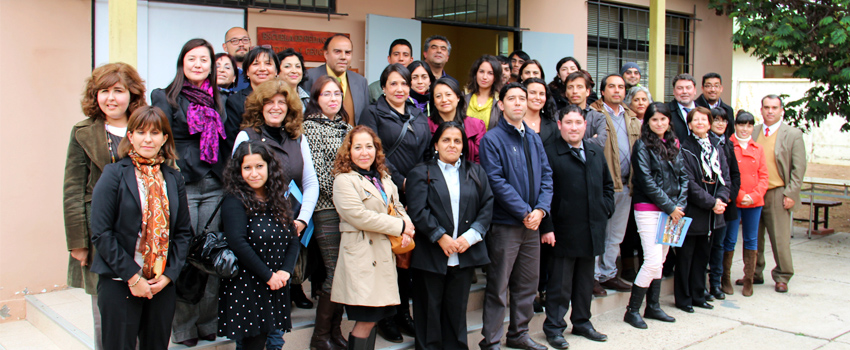
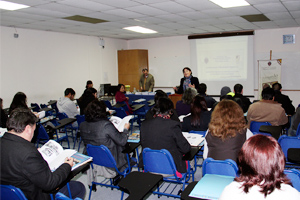 That is why the day included the conferences ''Presence of Indigenous Peoples in History Textbooks'', by Dr. Erika Zúñiga, from the ULS Department of Education, and ''Development of Cognitive Skills and their Classroom Application'' (EDUCREA materials), from Mg. Ximena Cortés, from the Department. of Cs. Social ULS and English Catholic School of La Serena.
That is why the day included the conferences ''Presence of Indigenous Peoples in History Textbooks'', by Dr. Erika Zúñiga, from the ULS Department of Education, and ''Development of Cognitive Skills and their Classroom Application'' (EDUCREA materials), from Mg. Ximena Cortés, from the Department. of Cs. Social ULS and English Catholic School of La Serena.
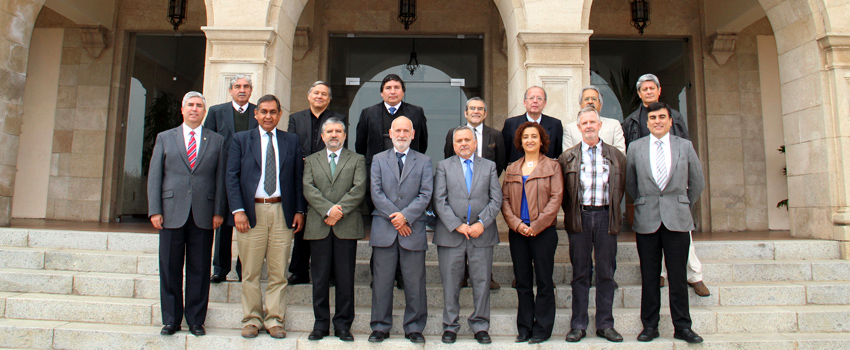
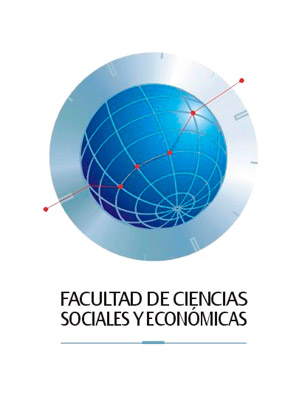 The activities began on Monday the 21st and will continue until Wednesday the 30th of this month.
The activities began on Monday the 21st and will continue until Wednesday the 30th of this month.
 It is important to mention that the work in this area has already spanned three years, working jointly from the Mistraliano Center, focusing ''all actions on Las Compañías precisely because we consider that the territory that surrounds this Center, which belongs to the ULS , is a very good bridge between the University and the community'', mentions the director of CREDEULS, who adds that the teams led by other academics have also joined the sector, carrying out actions in various fields.
It is important to mention that the work in this area has already spanned three years, working jointly from the Mistraliano Center, focusing ''all actions on Las Compañías precisely because we consider that the territory that surrounds this Center, which belongs to the ULS , is a very good bridge between the University and the community'', mentions the director of CREDEULS, who adds that the teams led by other academics have also joined the sector, carrying out actions in various fields. 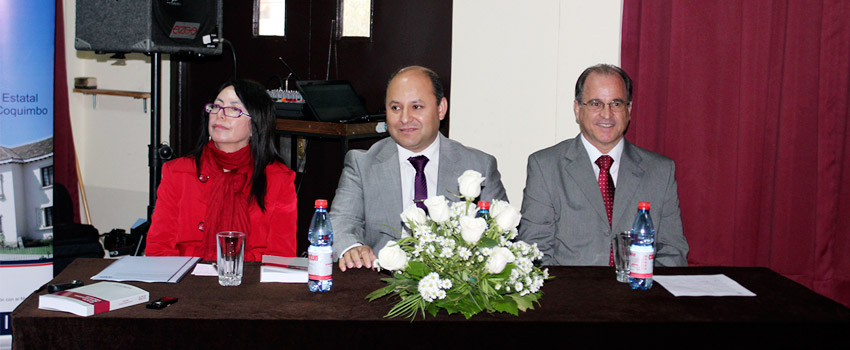
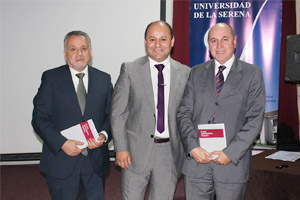 Subsequently, the lawyer and Mg. Ximena Rodríguez, current head of the Legal Department of the Regional Directorate of the Internal Revenue Service (SII), introduced the author, with whom she has shared duties since 2009. In her words she highlighted Zurita's multifaceted character, her rigor in work and permanent interest in knowledge. Since 2011, they have been close collaborators, enriching the Coquimbo Region team.
Subsequently, the lawyer and Mg. Ximena Rodríguez, current head of the Legal Department of the Regional Directorate of the Internal Revenue Service (SII), introduced the author, with whom she has shared duties since 2009. In her words she highlighted Zurita's multifaceted character, her rigor in work and permanent interest in knowledge. Since 2011, they have been close collaborators, enriching the Coquimbo Region team.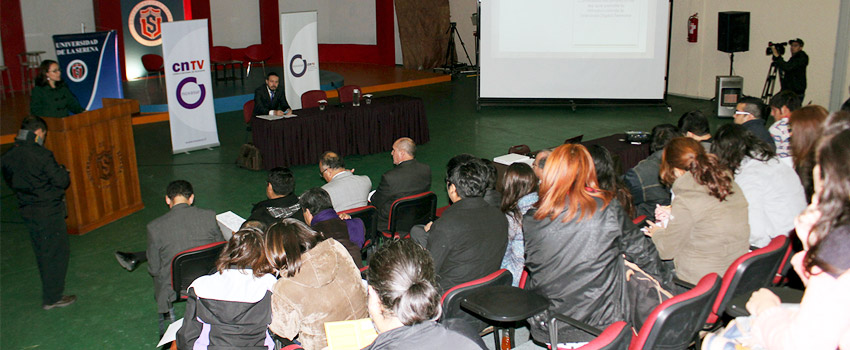
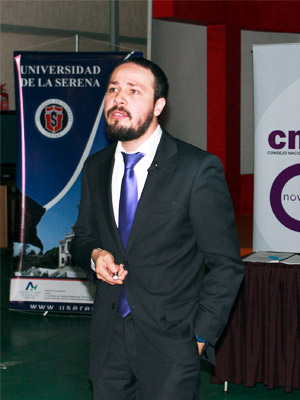 Subsequently, Felipe Ahumada Morasky, lawyer from the Legal Department of the National Television Council, detailed the scope and content of the bill that allows the introduction of digital terrestrial television (DTT).
Subsequently, Felipe Ahumada Morasky, lawyer from the Legal Department of the National Television Council, detailed the scope and content of the bill that allows the introduction of digital terrestrial television (DTT).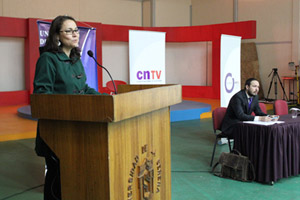 As specialists admit, perhaps the most relevant modification of the bill has to do with the reformulation of the concession system related to free-to-air television broadcasting. In this sense, new categories of concessionaires (national, regional, local and community) are created and the possibility of operating concessions with own or third party resources is established. In this regard, article 13 bis (Antenna Fund) is repealed and transferred under a new configuration to the Undersecretary of Telecommunications.
As specialists admit, perhaps the most relevant modification of the bill has to do with the reformulation of the concession system related to free-to-air television broadcasting. In this sense, new categories of concessionaires (national, regional, local and community) are created and the possibility of operating concessions with own or third party resources is established. In this regard, article 13 bis (Antenna Fund) is repealed and transferred under a new configuration to the Undersecretary of Telecommunications.